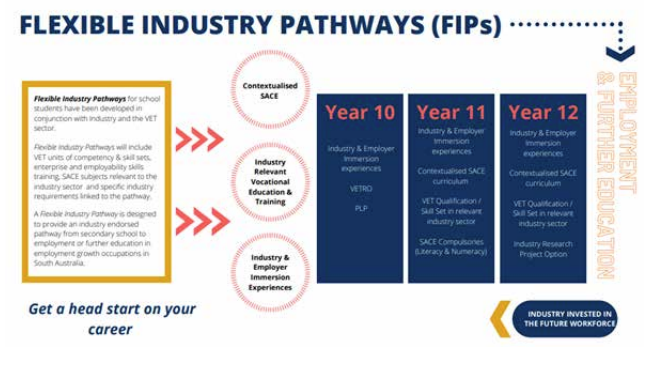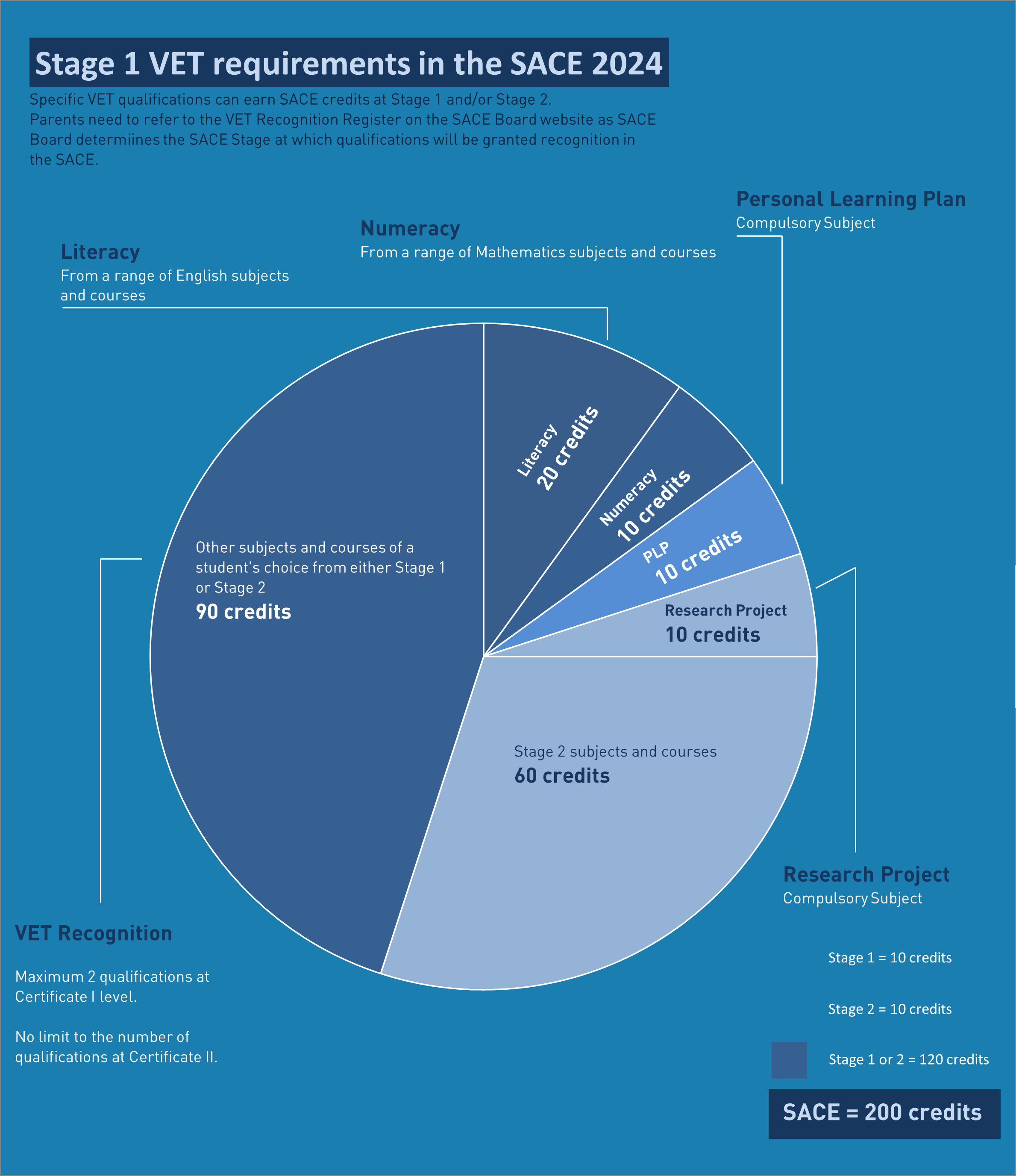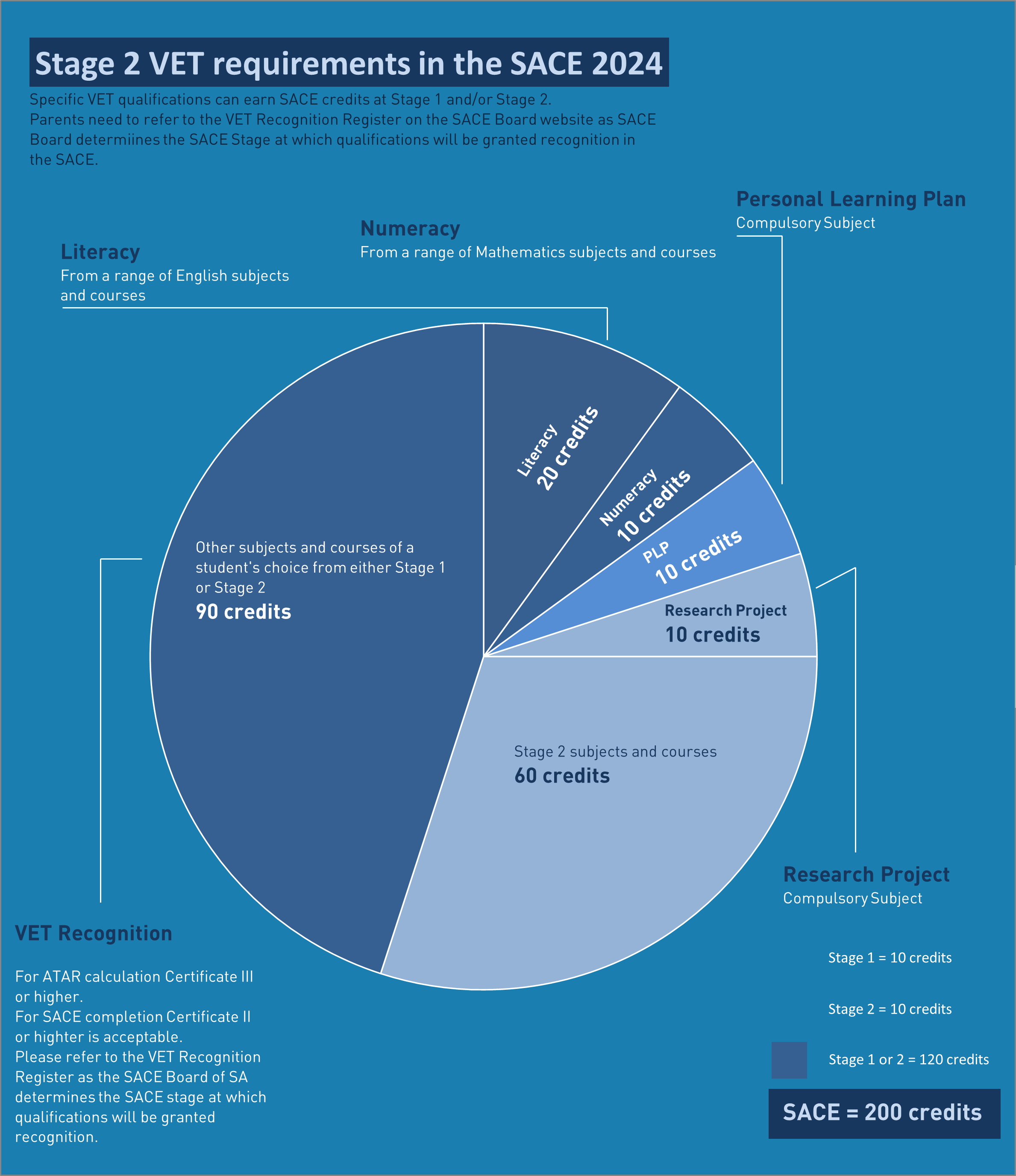Vocational Education and Training (VET)
What is VET?
VET stands for Vocational Education and Training. All training is competency based and provides students with the opportunity to acquire practical work-related skills together with the underpinning knowledge which will assist them in getting a job. It allows all young people to experience the world of work in a range of occupations whilst still at school. At Blackfriars Priory School VET is also used as a career exploration tool and as an opportunity to develop networks in the industry.
All VET Programs develop industry-related skills through:
• off the job training – either at school by trained teachers or by a training provider
• on the job training – learning and assessment occurs within the workplace. This is called Structured Work Placement.
All VET Programs are accredited towards the SACE and the students also gain a nationally recognised qualification which links to further training or higher education.
Off-line VET subjects, which gain units towards SACE, can be studied in Year 10, 11 and 12. VET programs can be accessed through TAFE SA or a private RTO (Registered Training Organisation).
Blackfriars Vocational Education Partnership
Rationale
Blackfriars offers a diverse range of learning pathways to assist students in achieving their SACE and get a head start on their career goals. VET courses act as a transition between school curriculum and the hands-on world of work, as they integrate transferable work-based skills with traditional classroom learning.
Vocational Education Courses
External VET courses include, but are not limited to:
- Flexible Industry Pathway Students (FIPS)
- Stackable VET
- Fee for Service VET
- Trade Taster short courses
- Micro-credentials.
A range of courses is available through Western Technical College: https://www.wtc.sa.edu.au/programs
Parent/Student Obligations
For all external VET courses, parent/student obligations include:
- 50% parental contribution to VET courses capped at $1,000.00 per student per calendar year
- Students need to complete the qualification or fees are required to be repaid
- If a student leaves Blackfriars prior to graduation or attaining employment in the chosen VET course/field, fees are required to be repaid
School Based Apprenticeships
- In the case where a student commences an SBA and is attending school parttime, a discretionary discount may be available upon application. This application will need to be approved by the Learning Engagement and Pathways Coordinator (VET Coordinator) and the School Principal.
Competency–Based Training
Competency looks at workplace expectations rather than the actual learning process. It refers to skills and knowledge which can be transferred and applied to new situations and environments. Competence is a combination of knowledge, skills and attitudes required in the workplace and their application to the standard expected in the workplace.
Training is undertaken in a classroom, workshop, the workplace or a combination of all these. It can lead to a qualification, which is recognisable, portable and consistent across the country. What a person already knows is taken into account irrespective of how the knowledge and skills were gained.
Why choose a VET Program?
- to explore possible areas of interest, which will support you in making an informed decision about further study and work
- to investigate career opportunities in a specific industry
- to develop industry specific knowledge and vocational skills
- to gain nationally recognised VET qualifications
- to develop a positive sense of self
- to receive credit towards traineeships and apprenticeships
- to learn ‘on the job’ while undertaking structured work
- to develop and understand the knowledge, attributes and skills employers value and which are relevant to most pathways.
Any students choosing a VET Program in Year 10, Stage 1 or Stage 2 will need to meet with the SACE and Pathways Coordinator to ensure students are able to build a pathway in the SACE through VET.
SACE completion using VET
VET gives students skills for work, particularly in the trades and industry. Students are able to build pathways in the SACE using VET. VET options in the SACE encourage students to complete, or make significant progress towards completing, VET qualifications while completing the SACE.
To complete the SACE, students must achieve 200 SACE credits, 180 of which can be gained through VET. Within these, students must also satisfy the literacy and numeracy requirements of the SACE. The remaining 20 credits are gained from the Personal Learning Plan (10 credits) and the Research Project (10 credits).
The recognition arrangements for VET in the SACE include:
- completed qualifications
- partly completed qualifications.
Students can earn 5 SACE credits for successfully completing 35 hours of VET, and 10 SACE credits for 70 hours. The SACE Board determines whether the SACE credits earned for a particular VET qualification will be recognised at Stage 1 or Stage 2. Students can refer to the VET Recognition Register for more information about recognition at Stage 1 and Stage 2. For more information about VET and to check the VET Recognition Register, visit: Recognised learning - South Australian Certificate of Education (sace.sa.edu.au)
Number of VET qualifications
All VET qualifications or units of competency which make up a qualification, in the Australian Qualifications Framework (AQF) can contribute to the completion requirements of the SACE. There is no limit to the number of qualifications at Certificate II level or higher that students can use to gain credits towards the completion of the SACE. For details of how specific VET qualifications can earn SACE credits at Stage 1 and/or Stage 2, refer to the VET Recognition Register on the SACE Board website: www.sace.sa.edu.au.
VET reporting
Students’ VET achievements will be reported on their SACE Record of Achievement against the relevant qualification(s) they have successfully undertaken.
School-Based Apprenticeships
School-Based Apprenticeships enable the student to gain a vocational and technical qualification while completing their school studies.
School-Based Apprenticeships (SBA) are a great career option for students in Year 10, 11 and 12, who are 15 years or older and/or eligible for enrolment in SACE.
They have a number of features:
- You can finish Years 11 and 12 while you start your apprenticeship
- You are paid a training wage or apprentice wage for the time you spend ‘on-the-job’ with your employer
- You are covered by a training contract, which links to an industrial award or agreement.
Apprenticeships provide nationally recognised qualifications and competencies and are offered at all certificate levels up to Advanced Diploma. Once completed the qualification can lead to continued employment, self-employment, further training or education.
Students are paid while training, which is structured, and can take the place of casual work. The rate of pay varies depending upon the industry, the year level, the qualification and whether industry or national awards are used. Your Australian Apprenticeship Centre or Industry Association should be able to provide more detail.
School–Based Apprenticeships traditionally require a minimum of 7 hours of work or training. The student will receive SACE credits for the VET units they cover as part of their School–based Apprenticeship and can select flexible subjects to study which ensure they receive their SACE certificate.
In most cases students find their own School–based Apprenticeship. There are a number of ways to find an Australian Apprenticeship:
- Visit potential employers
- Contact your local Job Services Australia provider
- Visit an Australian Apprenticeships Centre to obtain further information.
If this is something you are interested in please visit www.australianapprenticeships.gov.au and speak to the SACE and Pathways Coordinator.
Please note that vocational courses may incur some additional fees.
Flexible Industry Pathways (FIP’s)
Flexible Industry Pathways (FIP’s) are a way of approaching the delivery of Vocational Education and Training (VET) in schools. Flexible Industry Pathways are designed to prepare students for the world of work as well as meeting industry and employer’s needs.
Flexible Industry Pathway programs have been designed in consultation with industry and are aimed at equipping students with the skills, knowledge and qualifications to enter into employment or further study in the industry. Flexible Industry Pathways provide students with a clearly articulated pathway through secondary school to employment, or further education in key growth industries across South Australia.
Depending on the needs of employers, FIPs include VET qualifications at Certificate I, II and III level’s that industry considers suitable for school students. They also include employability skills training delivered through SACE curriculum, and any specific industry requirements linked to the pathway.
FIPs can include multiple options depending on the student, their entry level, overall program of study and the industry requirements. Students will undertake competencies from national training packages which have been nominated by industry to support relevancy and access to future employment opportunities as well as contextualised SACE curriculum.
Students will be supported to identify an appropriate Flexible Industry Pathway suited to their interests and strengths.
To be eligible for FIPS subsidised training, students must be:
- Enrolled in Year 11, 12 or 13 and are 16 years of age or turning 16 years of age in the current year of that enrolment, and are undertaking SACE or equivalent and,
- Have relevant industry exposure, accredited training, or SACE curriculum-based project work.
More information regarding VET for schools and FIPS is available here; VET for school student (tafesa.edu.au)
Flexible Industry Pathways are available in the following areas:
- Primary Industries & Agriculture
- Forestry
- Health & Community Services
- Tourism, Event Management & Hospitality
- Automotive
- Building & Construction
- Engineering & Civil
- Education, Early Childhood and Child Care



